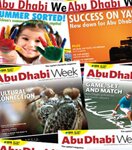A surprising amount of research suggests that kids who study music tend to perform better academically – Abu Dhabi Week takes a look at how learning to play is helping students succeed at school

William MacIlvoy has been studying the trumpet for two years, but he’s always been a fan of music. Later today he’ll give a performance at his school, but what he’s learned in his music lessons will help him out all day long. He begins his day in English class with a lesson on scanning poetry for rhyme scheme and meter.
“Kids who understand rhythm will have an easier time hearing the iambic pentameter that Shakespeare used so often,” says IB English teacher Ryley Farrell. “Being able to identify iambic pentameter will help students recognise a sonnet when they see one. Also, kids who are used to hearing rhyming music will have an easier time understanding rhyming poetry.”
It’s no wonder. Learning music helps even babies and little kids, like William’s five-year-old sister Mary Beth, benefit from exposure to music.
“The sooner a baby is exposed to music, the better it is for brain development,” says Kindermusik instructor Hanneke Willson. “Music is the only activity in which all the parts of the brain are used simultaneously. Even very young babies can recognise different songs and have their favourites.
“Through movement and music – including singing – a very young child can develop good listening and auditory skills. They can learn sequencing and how to recognise and create a steady beat which is great for their development in sports, dancing, writing and the use of scissors. Music can also help develop language, vocal expressiveness and communication,” says Hanneke.
After English, William moves on to his maths class – where his study of music may be most critical.
“Everything in a musical key also has a numeric value,” says Geoff Sinker, professional musician and guitar teacher at The Young Musician Music Institute (www.tymmi.com). “When you break down a line of music, you get eighths, sixteenths, thirty-seconds, sixty-fourths. It’s seen as a fraction; we just have different words for them.
“We do a lot of formulas in music. It’s like algebra – if you have one number then you can always calculate the other numbers. It’s the same with the formulas of music. A major scale has a set formula and we just change the letters of that formula to create harmony and minor scales,” Sinker adds.
The use of those formulas will also apply in science class. Even better, a 1993 study conducted by psychologists at the University of California suggested that music can improve higher brain functioning and may have a long-term effect on abstract reasoning skills if the brain is exposed to it early enough. The study revealed that children who received voice and piano lessons performed 35 percent better in mathematical reasoning than those who received no musical training.
It’s time for social studies, and William still has an advantage over his less musical friends. Throughout history, man has expressed himself through music, and William’s background in music will help give him more perspective about different eras than simply reading about them ever will.
Kitted out for a game of basketball during PE, the rhythm William has learned from practicing his instrument will help him dodge the opposing team’s defenders and make that goal. It’s no secret that there’s an obvious relationship between music, dance and athletic ability – just look at the 2004 study of patients with Parkinson’s disease that suggested that music reduces muscle tension and improves body movement and coordination.
Though William’s school day has ended, some of the best benefits of learning music will make themselves evident this evening. At his performance tonight, William will have to stand up in front of a crowd of strangers and play with passion. All the hours he’s spent practicing will bring joy to other people but will also leave him with the discipline it takes to succeed at other tasks he’ll encounter in life.
After the performance, William’s planning to go out with his other musician friends. No one can say that learning music doesn’t help social skills – just ask any rock star. And famous or not, a lot of kids find playing music is the perfect way to unwind.
“Music is a passion of mine and I have always been into it since I was a kid,” says Amellia Fox, age 17, who has been studying the piano for over six years. “I play the piano when I want to get away from things and just relax. In that sense, music has really helped me grow as a student and as an individual.”
Laura Fulton





